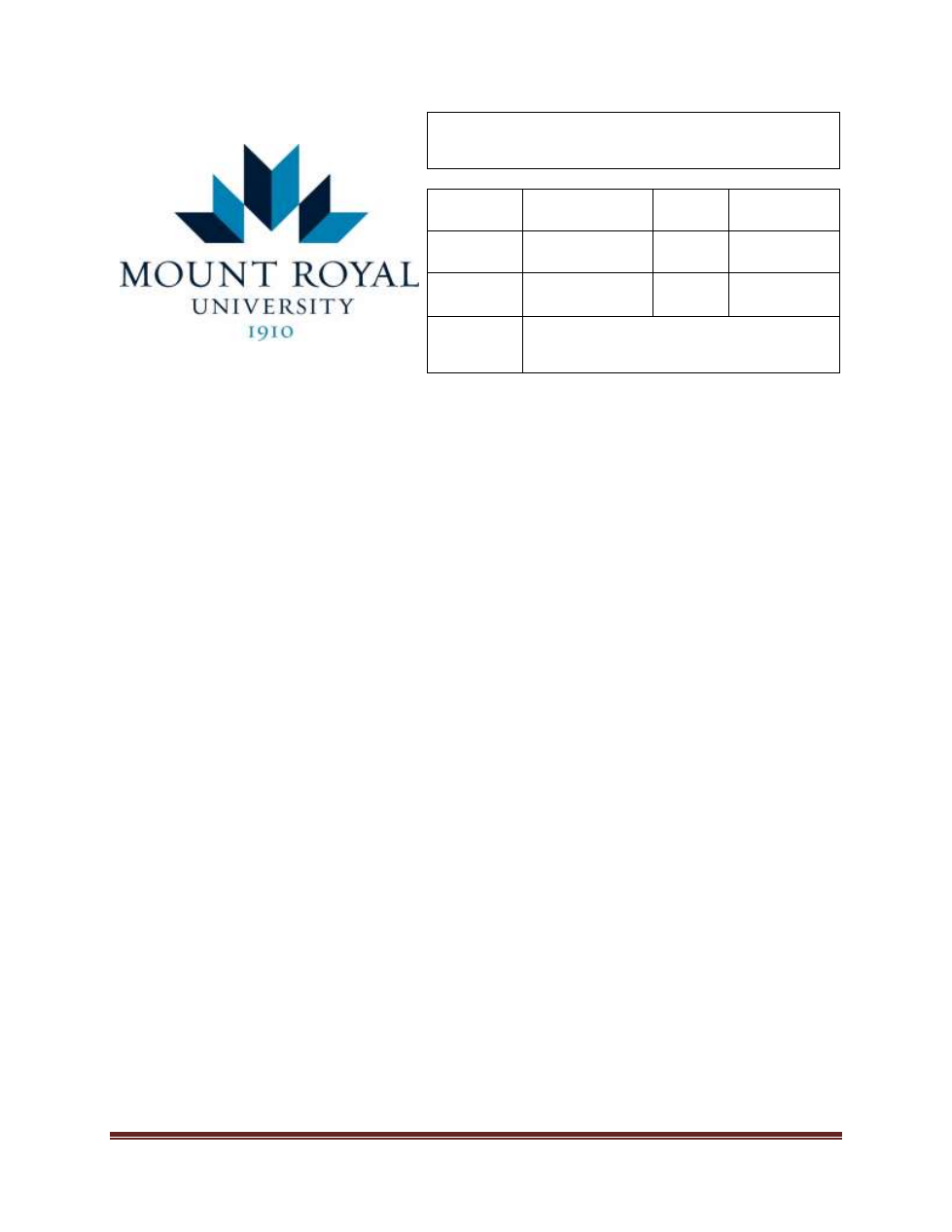
Sustainable Purchasing Guidelines – September 30, 2014
Page 1 of 4
SUSTAINABLE PURCHASING GUIDELINES
Procedure
Type:
Management
Initially
Approved:
September 30,
2014
Procedure
Sponsor:
VP, Administrative
Services
Last
Revised:
September 30,
2014
Administrative
Responsibility:
AVP, Finance and
Commercial
Operations
Review
Scheduled:
May 2025
Approver:
Executive Leadership Team
A.
PROCEDURES
1.
SUPPLY CHAIN SERVICES RESPONSIBILITIES
1.1
The Supply Chain Services department is responsible for the management of all
purchasing activities on behalf of the University. Supply Chain Services has the
authority to design and manage purchasing programs, practices and procedures.
1.2
Mount Royal University is committed to minimizing the negative impact of its
operations on the environment. Supply Chain Services contributes toward this goal
by assisting departments in the procurement of goods and services that fully meet
or exceed business requirements while;
a.
Minimizing resource consumption (including energy).
b.
Reducing or preventing the generation or release of waste, greenhouse
gases, and other pollutants to air, water and land.
c.
Managing waste in an environmentally responsible manner.
d.
Protecting health and well-being.
1.3
Supply Chain Services manages all centralized purchases on behalf of the
University through:
a.
Competitive Bidding Opportunities (Tenders and Requests for Proposals)
– Buyers are to review the Sustainability Purchasing Guidelines at the
project start up meeting. This gives the selection committee/project
manager a chance to specify what is applicable to that particular
competitive bidding opportunity.
b.
Purchase Orders: Buyers are to take into consideration the Sustainability
Purchasing Guidelines when issuing Purchase Orders to vendors.
c.
Supply Chain Services will provide the Sustainability Purchasing
Guidelines on the Mount Royal University intranet site for all those who
make purchases using P-Cards or any other payment method.

Sustainable Purchasing Guidelines – September 30, 2014
Page 2 of 4
2.
DEPARTMENTAL RESPONSIBILITIES
2.1
University faculties and departments are responsible to:
2.2
Participate in Project Start-Up Meetings and provide feedback to Supply Chain
Services regarding the sustainability considerations in the Sustainability
Purchasing Guidelines.
2.3
Consider the Sustainability Purchasing Guidelines when making any purchases.
Faculties and departments may consult with Supply Chain Services at any time
regarding these guidelines.
3.
GENERAL GUIDELINES FOR SUSTAINABLE PURCHASING
Sustainability Considerations are listed in the following table. This list is not exhaustive
and other sustainable considerations may be appropriate.
Disposal
Is it recyclable, and is it recyclable in the local facilities available to Mount
Royal University?
Can we ask the vendor to take it back when the product becomes
obsolete?
Is there an end of life program that includes re-use, recycling and/or
refurbishing?
Durability and
Reusability
Pens, towels, uniforms, etc.
Recyclable and/or made from recycled material (recycled paper, plastic,
or wood).
Can the product be re-used, refilled, re-charging or re-conditioned to
extent its life?
Energy
Efficiency
Well known product certifications for energy savings (e.g., Energy Star).
Efficient use. Ask vendors for training to ensure maximum efficiency.
Power saving features (avoid equipment that can’t be turned off or that
has no power saving mode).
Energy efficient lighting and motion sensors.

Sustainable Purchasing Guidelines – September 30, 2014
Page 3 of 4
Local
When price, fitness, availability and quality are equal then consider the
transportation and carbon emissions needed to provide the product or
service.
Packaging
Options to minimize packaging and/or return packaging.
Packaging made from recycled materials.
Reusable packaging.
Vendor route optimization to reduce carbon emissions.
Recycled
Content
Products which are easily recycled at local facilities.
Amount of recycled content (100% preferred).
Post-consumer waste content.
Recycled content beyond paper: toners, fabric, furniture, construction
material, paints, etc.
Total Cost of
Ownership
Offsetting higher initial pricing with lower operating costs for energy
and/or water demands over the life span.
Cost of auxiliary products – toners, trash can liners, batteries, etc.
Reduction of costs from a vendor take-back program or re-use.
Toxics
Third party certifications (e.g., Green Seal, Ecologo, FSC).
BPA-free plastics.
Lead-free products.
Bio-degradable products.
Water
Efficiency
Low Flow.
Auto Sensors.
Flow restrictors.
“High efficiency” labels or certifications.
Energy
Conservation
Power management setting for appliances and electronics. Does the
item have different energy consumption rates for all operation modes?
Optimized settings for heating and cooling.
Transportation
Use of fuel efficient vehicles (later models preferred).
Route optimization for deliveries.

Sustainable Purchasing Guidelines – September 30, 2014
Page 4 of 4
Waste Manage-
ment and
Recycling
How waste from construction or services will be re-used or disposed of.
Electronic processes may reduce or eliminate the need for paper based
processes.
Making use of on-line ordering systems.
B.
REVISION HISTORY
Date
(mm/dd/yyyy)
Description of
Change
Sections
Person who
Entered Revision
(Position Title)
Person who
Authorized
Revision
(Position Title)
09/30/2014
NEW
01/19/2022
Editorial
Policy Contact
Policy Advisor
General Counsel &
University Secretary



